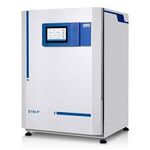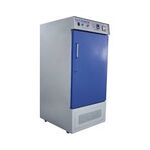Laboratory Incubator
What is a Laboratory Incubator?
Laboratory incubators are essential equipment used in medical and research settings. Its job is to create a controlled environment where cells, bacteria, fungi, and other microorganisms can grow and be maintained. It provides the best conditions for cultures by controlling temperature, humidity, and gas levels (such as CO₂) so they can grow well.
Use of Laboratory Incubators:
Incubators are used for several important purposes in hospitals and laboratories:
- Identify Infections: Bacteria or fungi are grown from patient samples to diagnose infections.
- Cell Culture: Human or animal cells are grown for research or treatment purposes.
- For drug Testing: The effect of drugs on cells or germs is studied to understand their safety and effectiveness.
Check Pollution: Water samples are tested by measuring BOD (Biological Oxygen Demand), which indicates how polluted the water is.
Benefits of Laboratory Incubator:
Laboratory incubators have many advantages:
- Stable conditions: They maintain constant temperature and humidity, which ensures trusted test results.
- Multipurpose use: They can be used in a wide range of applications, from microbiology to pharmaceutical research.
- Consistent results: They provide a controlled environment, which ensures experiments produce the same results over and over again.
- Safety measures: They include features such as alarms and sterilization that prevent contamination and ensure user safety.
Understanding Laboratory Incubator Types and Their Price Ranges:
Laboratory incubators come in various types, each designed for specific applications:
- CO₂ Incubators: Maintain consistent CO₂ levels to support doctors in creating stable environments, ideal for healthy and good cell culture.
- BOD Incubators: Designed for low-temperature applications
- Shaker Incubators: Provide controlled shaking motion, ideal for enhancing microbial growth and uniform culture conditions.
- Refrigerated Incubators: Equipped with cooling functions to maintain low temperatures, supporting sensitive sample preservation and stable culture growth.
Laboratory Incubator Types Price Ranges:
Laboratory Incubator Types | Price Range |
₹50,000 to ₹2,00,000 | |
₹40,000 and ₹1,50,000. | |
Shaker Incubators | ₹60,000 to ₹2,50,000. |
Refrigerated Incubators | ₹70,000 to ₹3,00,000. |
Prices vary based on features, capacity, and brand.
Applications of Laboratory Incubator:
Laboratory incubators are used in medical and scientific fields:
- Microbiology: Isolating and identifying pathogens.
- Environmental analysis: Monitoring the presence of microorganisms in water and soil.
- Pharmaceutical research: Assessing antimicrobial activity and drug response.
- Food testing: Detecting infection-causing organisms in foods.
- Biotech work: Studying cellular behavior and gene-based interventions.
Functions of the Laboratory Incubator:
Laboratory incubators perform several essential functions:
- Thermal stability: Maintains ideal temperatures for microbial and cellular cultures.
- Moisture balance: Maintains humidity to prevent samples from drying out.
- Gas atmosphere: Replicates physiological conditions by regulating CO2 and O2 levels.
- Mechanical agitation: Shaker models provide gentle agitation for uniform nutrient exposure.
Buy Laboratory Incubators from Trusted Brands at Biomed Suppliers:
At Biomed Suppliers, we offer a wide range of laboratory incubators from reputable brands. Our products are known for their trusted, precision, and durability. Whether you need a CO₂ incubator for cell culture or a BOD incubator for environmental testing, we have solutions to meet your needs.
1. Esco
2. Medicaid
3. Thermo Fisher
4. Max Life
5. Microlab
Things to Consider Before Buying a Laboratory Incubator:
Before buying a laboratory incubator, it is important to consider these points:
- Experimental requirements: First, assess what conditions are needed for your protocols and studies.
- Temperature specifications: The device should provide the thermal range that is necessary for your research.
- Internal volume: Choose the appropriate chamber size according to the sample load.
- Advanced controls: Evaluate functions such as humidity, gas levels, and speed, if required.
- Cost-effectiveness: Compare several models to choose the best option within the budget.
Maintenance Tips for Your Laboratory Incubator:
Regular maintenance is essential to maintain the efficiency and lifespan of a laboratory incubator:
- Cleanliness: Regularly disinfect the chamber and surfaces to avoid microbial buildup.
- Parameter accuracy: It is necessary to calibrate temperature and humidity settings periodically.
- Regular checks: Inspect internal components and controls for any irregularities.
- Professional maintenance: Periodic technician servicing keeps equipment performance consistent.
Why Buy From Biomed Suppliers?
There are many clinical benefits of working with Biomed Suppliers:
- Trusted quality: Trusted products are supplied from reputed brands, ensuring consistent performance.
- Expert guidance: Incubator selection receives expert inputs based on your research and clinical requirements.
- Value for money: Cost-effective solutions are provided without compromising on quality.
- Post-purchase care: Full support is available from installation to regular maintenance.
FAQs About Buying Laboratory Incubators:
How Much Does a Laboratory Incubator Cost?
The price ranges from ₹50,000 to ₹3,00,000 depending on the brand, model, and features.
What is the ideal temperature for a BOD incubator?
The standard temperature for BOD testing is 20 °C, as recommended for oxygen demand testing.
Can a BOD incubator be used for other applications?
Yes, BOD incubators are versatile and can be used for microbial culture, pharmaceutical research, and biotechnology experiments.
How do I choose the right laboratory incubator?
Consider factors such as application requirements, temperature range, capacity, features, and budget when selecting an incubator.
What maintenance is required for a laboratory incubator?
Regular cleaning, calibration, inspection, and professional servicing are essential to maintain the incubator's performance.


